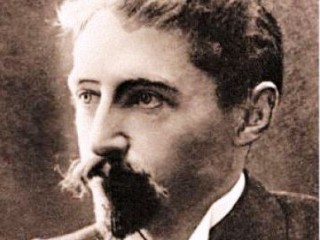
Ivan Bunin biography
Date of birth : 1870-10-22
Date of death : 1953-11-08
Birthplace : Voronezh, Russian Empire
Nationality : Russian
Category : Famous Figures
Last modified : 2011-07-04
Credited as : Short story writer, In the Open Air , Falling Leaves, Nobel Prize for literature
Ivan Alekseevich Bunin was born on his impoverished but proud family's estate near Voronezh in Oryol Province on Oct. 10/22, 1870.
Ivan grew up with a love for family traditions and a high regard for the works of Aleksandr Pushkin. In 1881 he entered the gymnasium (secondary school) in Elets but withdrew after 3 years and was tutored by his older brother. In 1889, however, family poverty forced Bunin to go to work. He held various technical and clerical jobs on provincial newspapers.
In 1891 Bunin published Poems, a volume that celebrated the natural world and was classical in style. Other collections of poetry followed—In the Open Air (1898) and Falling Leaves (1901), which won the Academy of Sciences' Pushkin Prize in 1903. At the same time Bunin wrote stories and sketches about Russian rural life, among the most notable of which are "Tank," "At the World's End," and "News from Home." During the 1890s he was becoming a well-known figure in literary circles. The year 1891 marked the beginning of his friendship with Anton Chekhov. And in 1899 Bunin met Maxim Gorky, who introduced him to the Znaniye group, a circle of young liberal writers.
With the opening years of the 20th century, Bunin began to concentrate on prose forms. "Antonov Apples" (1900), "The Pines" (1901), and "The Black Earth" (1904) are among his finest stories. They are marked by love for the land as well as by social awareness. In his novels The Village (1910) and Sukhodol (1911), Bunin contrasts man's aspirations with the dismal record of failure seen in human history. These works display Bunin's use of striking metaphors and penetrating understatement. Bunin's prose style has been widely admired for its delicacy, subtlety, clarity, and strong musical quality.
Bunin's work was both popular and critically respected, and in 1909 the Academy of Sciences elected him to honorary membership. He traveled widely, and from 1907 to 1911 he published a series of sketches on the Mediterranean and the Near East. At the same time, his energetic talent explored urban themes (the satirical "A Good Life," told entirely in Elets dialect), presented psychological portraits of fierce intensity ("The Dreams of Chang," 1916), and exposed the internal contradictions of bourgeois civilization ("The Gentleman from San Francisco," 1916). His translations of The Song of Hiawatha, Lord Byron's plays, and other works were extremely successful.
Bunin opposed the Russian Revolution, and in 1920 he emigrated to France, where he lived until his death. Bunin's early themes often reappear in the works he wrote in exile-especially his use of autobiographical material in fiction (Arseniyev's Life, 1930) and his strong interest in death and idealistic passion ("Mitya's Love," 1925). During this period he also wrote books on Leo Tolstoy and Anton Chekhov. In his Memories and Portraits (1950) he attacked Soviet cultural debasement. Bunin died in Paris, on Nov. 8, 1953.

















